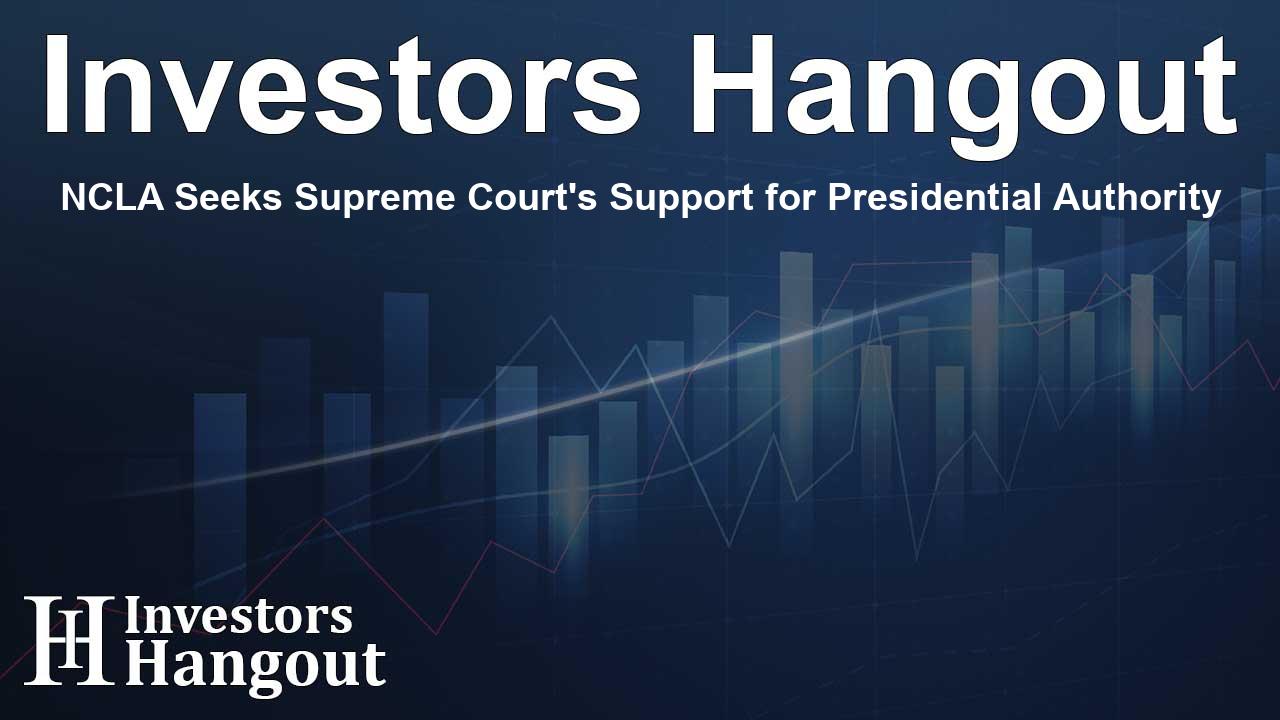NCLA Seeks Supreme Court's Support for Presidential Authority

NCLA Seeks Supreme Court's Support for Presidential Authority
Washington, DC, the New Civil Liberties Alliance (NCLA) has taken significant legal action recently, filing an amicus curiae brief in a pivotal Supreme Court case concerning presidential power. The organization argues for the President's authority to remove a member of the Federal Reserve Board, specifically targeting the Board member, Lisa Cook. This legal challenge stems from a lower court ruling that imposed restrictions on the President's ability to remove officials under certain circumstances.
The Case Background
NCLA's brief arises from the case of Trump v. Cook. Here, the district court ruled against President Trump’s ability to dismiss Cook from her position on the Federal Reserve Board based on a statute that permits removal only for cause. NCLA contends that this ruling undermines the constitutional powers allocated to the President, specifically stating that it hinders a fundamental duty to enforce laws faithfully.
The Role of the Federal Reserve
The Federal Reserve Board significantly influences economic regulations, wielding executive power that affects the entire nation. Article II of the Constitution vests the President with all executive powers, encompassing the authority to enforce regulations and hold individuals accountable for violations. Working within this framework, the NCLA believes it is essential for the President to have the discretion to appoint and remove Federal Reserve officials, thus maintaining a system of accountability.
Critical Statements from NCLA
NCLA has articulated strong positions regarding the importance of presidential power in relation to the Federal Reserve Board. Jacob Huebert, Senior Litigation Counsel at NCLA, stated that “the Constitution empowers the President to remove any federal official who exercises executive power, and it doesn't make an exception for officials of a central bank.” This assertion emphasizes the organization's view that Congress lacks the authority to create unaccountable agencies within the government structure.
Accountability in Governance
Mark Chenoweth, the President of NCLA, echoing these sentiments, noted the importance of democratic accountability, stating, “If the President cannot remove members from the Federal Reserve Board, then those board members are not democratically accountable to the American people. That would be intolerable to our system of self-government.” This perspective points to the fundamental principles of self-governance and the accountability expected from public officials.
NCLA - Advocacy and Purpose
NCLA is dedicated to defending civil liberties and ensuring accountability within governmental structures. Founded by noted legal scholar Philip Hamburger, the organization works tirelessly to protect constitutional freedoms from violations perpetrated by various governmental agencies. Through public-interest litigation and advocacy, NCLA aims to curtail the overreach of administrative powers and strengthen the protection of citizens' rights.
The Future of the Case
As the Supreme Court prepares to hear the arguments in Trump v. Cook, the implications of this case extend far beyond one individual's position on the Federal Reserve Board. The outcome could redefine the balance of power between the President and federal bodies, potentially rolling back the independence that some argue the Federal Reserve has historically maintained.
Frequently Asked Questions
What is NCLA's primary goal?
NCLA aims to protect constitutional freedoms and ensure accountability within the government’s executive branch.
What case is NCLA involved in regarding presidential powers?
NCLA has filed a brief in Trump v. Cook, advocating for the President's authority to remove Federal Reserve Board members.
Why is accountability important in governance?
Accountability ensures that public officials are answerable to the citizens they serve, thereby upholding democratic values.
Who founded NCLA?
NCLA was founded by legal scholar Philip Hamburger, focusing on civil rights and liberties in the context of administrative governance.
What could be the implications of the Supreme Court's ruling?
The ruling could reshape the balance of presidential powers relative to federal institutions, influencing the independence of those agencies.
About The Author
Contact Owen Jenkins privately here. Or send an email with ATTN: Owen Jenkins as the subject to contact@investorshangout.com.
About Investors Hangout
Investors Hangout is a leading online stock forum for financial discussion and learning, offering a wide range of free tools and resources. It draws in traders of all levels, who exchange market knowledge, investigate trading tactics, and keep an eye on industry developments in real time. Featuring financial articles, stock message boards, quotes, charts, company profiles, and live news updates. Through cooperative learning and a wealth of informational resources, it helps users from novices creating their first portfolios to experts honing their techniques. Join Investors Hangout today: https://investorshangout.com/
The content of this article is based on factual, publicly available information and does not represent legal, financial, or investment advice. Investors Hangout does not offer financial advice, and the author is not a licensed financial advisor. Consult a qualified advisor before making any financial or investment decisions based on this article. This article should not be considered advice to purchase, sell, or hold any securities or other investments. If any of the material provided here is inaccurate, please contact us for corrections.
